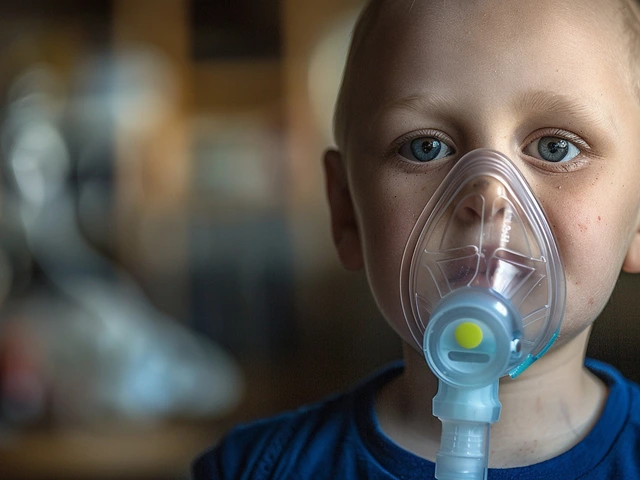The National Health Service (NHS) in the United Kingdom is currently facing a critical shortage of salbutamol, a lifesaving drug essential for managing chronic breathing difficulties such as severe asthma attacks and chronic obstructive pulmonary disorder (COPD). This shortage, affecting the 2.5 mg and 5 mg dose vials of liquid salbutamol, has raised significant concerns regarding the potential impact on patient care and the ability of healthcare providers to adequately respond to respiratory emergencies.
Salbutamol, widely recognized for its effectiveness in treating respiratory conditions, plays a crucial role in the management of asthma and COPD. It works by relaxing the muscles in the airways and increases air flow to the lungs, providing rapid relief from symptoms of breathing difficulties. The drug is commonly administered through nebulizers for patients who are experiencing severe exacerbations of their conditions or for those unable to use alternative delivery methods, such as pressurized Metered-Dose Inhalers (pMDIs).
The current shortage poses a significant challenge for medical professionals and patients alike. Health care providers are now instructed to prioritize the limited stock of salbutamol for critically ill patients who are facing acute exacerbations of COPD or asthma, experiencing anaphylactic reactions, or are incapable of utilizing pMDIs. This guidance underscores the severity of the situation, pressing medical personnel to minimize the use of nebulizers outside of these extreme circumstances in an effort to conserve the dwindling supplies.
Despite the assurances from the Department of Health and Social Care concerning the acquisition of adequate stock and the pursuit of alternative distributors, there remains an undertone of concern among specialists regarding the adverse effects this shortage could have on patient care. The inability to access this indispensable medication could result in compromised treatment for those in dire need, potentially exacerbating the conditions of individuals with severe asthma or COPD.
The shortage of salbutamol is a reflection of a larger issue within the healthcare system, pointing towards vulnerabilities in the supply chain that can have dire consequences for patient care. It highlights the need for a robust and resilient system capable of ensuring the continuous availability of essential medications, mitigating the risks of future shortages. As the healthcare community navigates through this crisis, the focus remains on safeguarding patient care and exploring all possible avenues to replenish the stocks of this critical medication.
In conclusion, the NHS is striving to manage the current shortage of salbutamol with the utmost care and consideration for patient well-being. Healthcare providers are making difficult decisions to allocate the limited supplies where they are most needed, while efforts to secure alternative sources of the medication continue. The situation serves as a stark reminder of the importance of a sturdy healthcare supply chain, capable of withstanding the challenges posed by unexpected shortages of essential medications. The hope remains that the shortage will be resolved swiftly, restoring the availability of salbutamol for all patients in need of this life-saving treatment.




Comments
I can’t shake the feeling that this shortage is just the tip of a massive, hidden conspiracy to control our very breath.
Salbutamol shortage? Oh, brilliant, just what the NHS needed to spice up its daily drama. While the officials promise a swift procurement, the real heroes – the patients – are left juggling nebulizers like improvised musical instruments. Good thing we have plenty of alternative distributors... oh wait, no we don’t. Anyway, stay tuned for the next episode of ‘Supply Chain Meets Soap Opera.’
Wow, reading about the salbutamol shortage feels like watching a thriller where the villain is an empty pharmacy shelf. Every inhaler, every nebulizer dose is a tiny lifeline for folks battling the relentless squeeze of asthma and COPD. When the NHS says they’re prioritising the most critical patients, I picture doctors holding a blinking red light, deciding who gets to breathe. But the reality is far less cinematic – it’s nurses flicking through inventory lists, patients calling frantic helplines, and families holding their breath, literally. Imagine a young child with a severe asthma attack, parents frantically searching for a spare inhaler, only to be told the stock is out. Or think of an elderly man with COPD who can’t even climb the stairs to the pharmacy, now forced to depend on a dwindling neb. The ripple effects extend beyond the bedside; it’s emergency departments will see a surge in admissions, stretching already thin resources. Pharmacies might start rationing doses, splitting vials, or even resorting to outdated alternatives that are less effective. All the while, suppliers scramble, paperwork flies, and political leaders promise a miracle without a clear timeline. It’s a perfect storm of bureaucracy, logistics, and human vulnerability, and we’re the ones left gasping for air. The good news is that the medical community is incredibly adaptable, often improvising with what’s on hand. Doctors can switch patients to metered‑dose inhalers when possible, and some clinics are experimenting with home‑use nebulizers. But those workarounds aren’t a blanket solution; they require training, equipment, and sometimes insurance approval. What we really need is a robust, transparent supply chain that can anticipate demand spikes before they become catastrophes. Until that happens, the best thing we can do is stay informed, support our local pharmacies, and advocate for policies that put patient safety first.
Enough with the polite press releases! This is a full‑blown crisis and the NHS is playing footsie with the problem. Stop pretending you can “prioritise” and start delivering! Patients aren’t waiting for your next memo-they need meds now.
The shortage highlights how interconnected our healthcare ecosystem truly is. Supporting local manufacturers and diversifying supply sources can build resilience. It’s a collective effort, and every stakeholder has a role to play.
From a linguistic standpoint, the terminology surrounding this shortage is both precise and emotionally charged, which can inadvertently amplify public anxiety. While the National Health Service employs technically accurate language, the repeated emphasis on “critical” and “life‑saving” inevitably triggers a heightened sense of urgency among patients and caregivers alike :). Moreover, the interplay between pharmaceutical logistics and clinical practice underscores a systemic vulnerability that transcends mere inventory counts. It is therefore incumbent upon policymakers to not only secure immediate stock replenishment but also to institute comprehensive contingency frameworks that address future disruptions in a methodical manner. In sum, the current predicament serves as a sobering reminder that even the most advanced health institutions are susceptible to the vicissitudes of global supply chains.
One would think that a nation priding itself on universal healthcare could anticipate such a basic omission, yet here we stand, stumbling over a vial of salbutamol. The sheer audacity of bureaucratic inertia in the face of preventable suffering is nothing short of tragicomic. Perhaps a reminder that when policymakers prioritize paperwork over patients, the latter inevitably pay the price.
Yo, this shortage is seriously messing up a lot of folks' daily routine. Definately need a backup plan, maybe local pharmacies can import from elsewhere fast?
In the grand tapestry of existence, a missing inhaler whispers of our fragile mortality, urging us to confront the absurdity of breath itself.
The situation, as described, is deeply concerning, especially for patients with chronic respiratory conditions, who depend on timely access to medication, yet the supply chain appears fragile, and the implications are far‑reaching.
Let’s rally together, share reliable sources, and keep the conversation alive so no one feels left in the dark.
Picture this: a bustling ward, straining under a wave of wheezing patients, all because a tiny bottle vanished from the shelves. That’s not a minor hiccup-it’s a full‑blown emergency that demands immediate action. Health officials must cut through red tape and source alternatives without delay. We can’t afford to wait for bureaucratic committees while people struggle for every breath.
Shortages like this really hit home for anyone dealing with asthma. Hope they fix it soon.
While your enthusiasm is commendable, the assertion that “the best thing we can do is stay informed” overlooks the necessity of concrete policy measures; without legislative action, information alone does little to mitigate a systemic supply crisis.